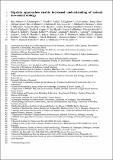Big-data approaches lead to an increased understanding of the ecology of animal movement
Abstract
Understanding animal movement is essential to elucidate how animals interact, survive, and thrive in a changing world. Recent technological advances in data collection and management have transformed our understanding of animal “movement ecology” (the integrated study of organismal movement), creating a big-data discipline that benefits from rapid, cost-effective generation of large amounts of data on movements of animals in the wild. These high-throughput wildlife tracking systems now allow more thorough investigation of variation among individuals and species across space and time, the nature of biological interactions, and behavioral responses to the environment. Movement ecology is rapidly expanding scientific frontiers through large interdisciplinary and collaborative frameworks, providing improved opportunities for conservation and insights into the movements of wild animals, and their causes and consequences.
Citation
Nathan , R , Monk , C T , Arlinghaus , R , Adam , T , Alós , J , Assaf , M , Baktoft , H , Beardsworth , C E , Bertram , M G , Bijleveld , A I , Brodin , T , Brooks , J L , Campos-Candela , A , Cooke , S J , Gjelland , K Ø , Gupte , P R , Harel , R , Hellström , G , Jeltsch , F , Killen , S S , Klefoth , T , Langrock , R , Lennox , R J , Lourie , E , Madden , J R , Orchan , Y , Pauwels , I S , Říha , M , Roeleke , M , Schlägel , U E , Shohami , D , Signer , J , Toledo , S , Vilk , O , Westrelin , S , Whiteside , M A & Jarić , I 2022 , ' Big-data approaches lead to an increased understanding of the ecology of animal movement ' , Science , vol. 375 , no. 6582 , eabg1780 . https://doi.org/10.1126/science.abg1780
Publication
Science
Status
Peer reviewed
ISSN
0036-8075Type
Journal item
Description
Funding: This work was supported by the MinervaCenter for Movement Ecology, the Minerva Foundation, grants ISF-3277/21, ISF-1272/21, ISF-965/15, ISF-1259/09, ISF-1316/05, MOST 3-17405, JNF/KKL 60-01-221-18, GIF 1316/15, and the Adelina and Massimo Della Pergola Chair of Life Sciences to R.N.; the Marine Science programme within the Research Council of Norway, grant 294926 (CODSIZE) to C.T.M.; the German Ministry of Education and Research (projects Besatzfisch) and Leibniz Community (project BType) to R.A.; the Danish Rod and Net Fishing License Funds to H.B.; DFG-GRK Biomove 2118/1 to F.J, ISF-1919/19 and ISF-965/15 to S.T.; and SCHL 2259/1-1 to U.E.S. We also acknowledge support from the project “Multi-Lake Research of Fish Ecology and Management using High-Resolution 3D Telemetry Systems”, funded by ALTER-Net within the Multi Site Research (MSR) initiative to I.J.Collections
Items in the St Andrews Research Repository are protected by copyright, with all rights reserved, unless otherwise indicated.

